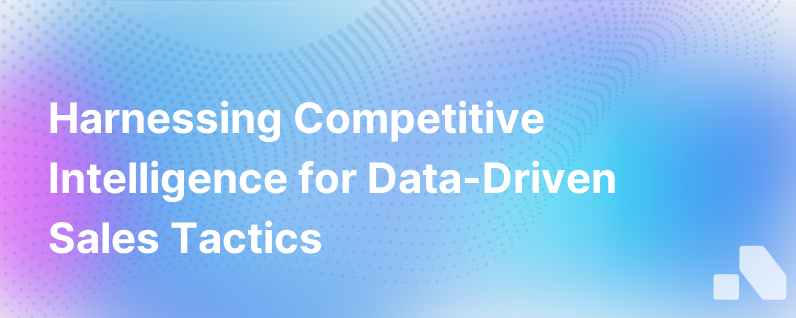Competitive Intelligence Data Backed Tactics
Published on November 10, 2023 by Sawyer Middeleer
Competitive intelligence is more than just trawling through an opponent’s blog or signing up for their newsletters. It requires a nuanced blend of data analytics, business strategy, and intuition. Ably equipped with data-backed competitive intelligence, B2B businesses can anticipate industry trends, predict competitor moves, make informed strategic decisions, and get a leg up in the market.
But how does one garner these insights, and more importantly, how does one translate them into actionable tactics? Whether you’re a Sales or Marketing Leader, a Product Manager, or a Business Strategist, this guide will outline why competitive intelligence matters and how data-backed tactics can drive your business forward.
Competitive Intelligence – Why It Matters
To shape your firm’s future, it’s imperative to appreciate the competitive landscape and understand your competitors' strategies, their strengths, vulnerabilities, and market positioning. Harnessing competitive intelligence aids you in:
- Gaining insights into competitor’s operations and performance.
- Anticipating business risks and opportunities.
- Formulating strategies to outsmart competitors.
- Fine-tuning your product or service to deliver maximum value.
- Empowering various business functions, like procurement, marketing, sales, and product development.
Competitive Intelligence Data-backed Tactics
- Market Trend Analysis: Before pinpointing individual competitors, broadly analyze your market. Use quantitative data such as market size, growth rate, customer segmentation to understand the market dynamics. Dive into qualitative data, like customer reviews, industry reports, and news articles, to gains insights into the customers' evolving needs, preferences, and pain points.
- Competitor Profiling: Identify your top competitors and use data to create detailed competitor profiles. These should include business information (revenue, market share), product/service information (following, unique selling propositions), marketing strategies (keywords, SEO rank), and their performance in various aspects (sale numbers, customer reviews). Competitor profiling gives you a comprehensive picture of your opponents.
- SWOT Analysis: Use the data you have gathered to conduct a SWOT analysis for your competitors—identify their Strengths, Weaknesses, Opportunities and Threats. Elsewhere, build a comparable SWOT for your business. Finally, contrast your SWOT with your competitors’ SWOTs to identify your relative advantage or disadvantage and tweak your strategic plan accordingly.
- Competitor Benchmarking: Benchmark your product/features against your competitors. Using data-backed insight, identify and invest in the elements that make your product superior. Also, learn from the areas where your competitors perform better and make the necessary adjustments to your product/offerings.
- Predictive Analytics: Use historical data and market trends to forecast the competitors’ future moves, whether it be a new product launch or a market expansion. Predictive analytics provides you the much-needed head start to plan your response.
- Social Listening: For real-time and granular insights, leverage social listening tools to monitor what customers and industry influencers say about your competitors on various social platforms, blogs, and forums. You can assess the public opinion of your rivals, their products, and their services, helping you tweak your customer engagement strategies and product offerings.
Integrating Competitive Intelligence into Your Business
Data-backed competitive intelligence is not just the Sales or Marketing team's lookout; it's an organization-wide focus.
- Marketing can use competitive intelligence to formulate campaigns that underline the unique features of your product, positioning it above the competition.
- Sales can leverage data-backed tactics to articulate your product's unique value proposition and rebut competitor strategies during the sales pitch.
- Product management can use insights to fine-tune the product, adding features that are in demand or enhancing user experience.
- Procurement can track competitors’ supplier strategies to strike favorable deals and alliances.
- Leadership uses intelligence to make strategic directional decisions and assess the company’s competitive standing.
Empower Your Competitive Intelligence with Aomni Despite the immense value it provides, competitive intelligence is a complex and time-consuming task. Generating actionable data-backed tactics regularly can be a demanding endeavor.
That's where Aomni comes in. Aomni’s AI platform amasses all the fundamental data you need, offering real-time account research, actionable competitive insights, and personalized sales content in just 15 minutes. It takes the grunt work out of competitive intelligence, letting you focus on utilizing those insights to drive your business strategies.
Wrapping Up
Every business operates in a competitive landscape. Understanding your competitors, tracking their moves, and predicting their strategies are the key to staying one step ahead. Adroitly deployed data-backed competitive intelligence techniques can prove instrumental in drafting potent business strategies that carve a niche for your business amid stiff competition. Implementing these data-backed tactics with a reliable tool as Aomni can be a game-changer for your organizational growth.